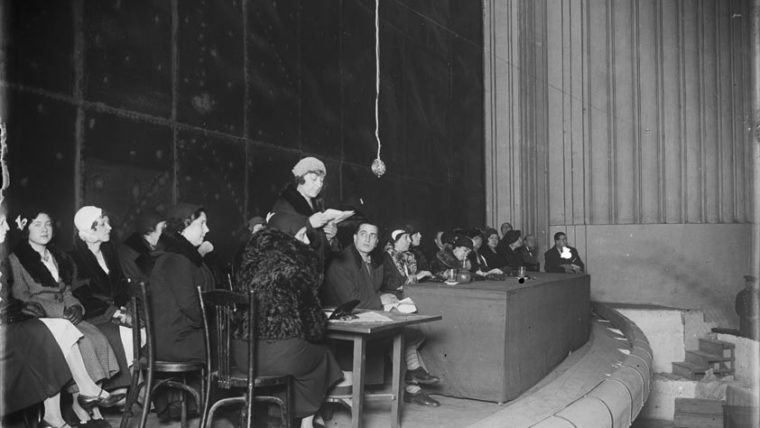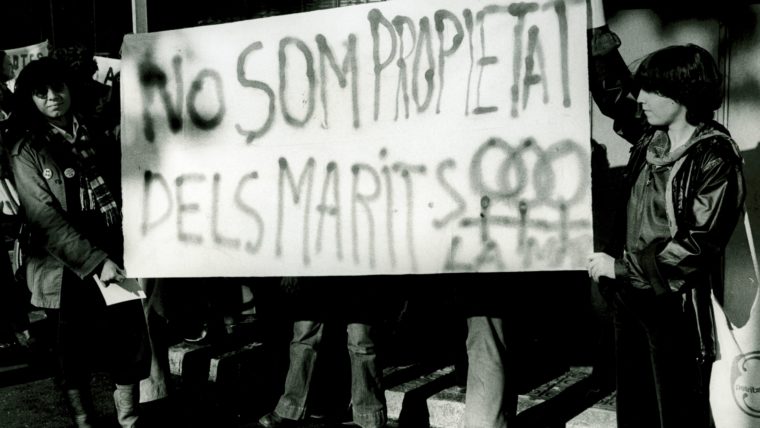Commemorating 90 years of women’s suffrage
The constituent assembly of the Second Spanish Republic approved women’s right to vote in Spain on 1 October 1931, a transcendental and historic moment which is being marked ninety years on with a programme of activities to regain the memory of the women who made it possible to achieve this fundamental right.
Clara Campoamor, a central figure in the feminist struggle
The lawyer and writer Clara Campoamor, a parliamentarian from 1931 to 1933, stood up for women’s right to vote as an essential conquest for building a fairer and more equal society. The parliamentary debate where Campoamor defended women’s suffrage practically single-handed concluded with a historic vote on 1 October 1931, gaining approval with 161 votes in favour, 121 against and 188 abstentions.
Events prior to a historic achievement
It took decades to achieve this historic landmark for democracy, through a struggle led by brave and persevering women and where collective strength meant their demands were heard. The first attempt to approve women’s vote came in 1907 but did not prosper. The feminist movement in Spain gained force at the end of the 1920s, following the lead of the pioneering suffragettes in the USA and UK with the creation of the Asociación Nacional de Mujeres Españolas (AMNE) in 1918, with figures such as Carmen de Burgos and Clara Campoamor, and the first major feminist demonstration in the Spanish state in 1921.
The approval of women’s suffrage represented a major victory in feminist movements at the time and was accompanied by the consolidation of women in political life. In 1933 women in the whole of Spain were able to exercise their right to vote for the first time, and in 1936 Frederica Montseny was the first woman to become a minister in the history of western Europe. A year later, Montseny named the doctor Amparo Poch as head of Social Care, tasked with receiving child refugees in Barcelona.
Activities to regain the memory of Clara Campoamor and the suffragette movement
With the outbreak of the Spanish Civil War, women such as Clara Campoamor, Amparo Poch and Frederica Montseny had to flee the country and go into exile to avoid persecution, prison or death. The dictatorship meant that all the rights gained and the memory of the feminist struggle would fall into oblivion. Campoamor and Poch would never return to Spain and died in exile, while there would be no voting here again until 1977, when democracy was restored.
With the goal of regaining the legacy of the women of the republic, particularly Clara Campoamor, her fundamental role in achieving the vote for women, and reflecting on the past, present and future of feminism, El Born Centre de Cultura i Memòria is organising a series of activities from 2 to 13 October:
- 2 October, opening ceremony for the cycle of activities: chaired by the Deputy Mayor for Social Rights, Global Justice, Feminism and LGBTI, Laura Pérez Castaño, and the Councillor for Democratic Memory, Jordi Rabassa, with contributions from Fina Birulés and Bel Olid. An audio-visual piece about Clara Campoamor will be screened during the ceremony, and fragments of texts by the writer from Madrid read aloud.
- 5 October, “Llums i ombres de la instauració del sufragi femení”: round table taking an essentially historical perspective and looking at the controversial process of approving the vote for women in Spain, both within the parliament and the social, cultural and political movements of the time. The session will look back at the life of Clara Campoamor and other figures, mainly women, who played a key role in the debate on women’s suffrage. Mary Nash, Marifé Santiago and Neus Samblancat are all expected to be involved in this session.
- 6 October, screening and talk on the audio-visual piece La mujer olvidada. Clara Campoamor y su lucha por el voto femenino, by Laura Mañà, based on the novel by Isaías Lafuente.
- 7 October, “Legalitats i legitimitats. La lluita feminista per als drets polítics i socials”: round table with Eugenia Rodríguez Palop, Encarna Bodelón and Pastora Filigrana.
- 13 October, “Vigència del llegat de Clara Campoamor”: round table with women from the political sphere analysing women’s political involvement in new forms of political action. From grassroots participation in social movements to institutional work, women help to broaden the terrain of politics.






Tags associated with the news item
Related news
-
 Democratic Memory
Democratic Memory
Democratic Memory
Democratic MemoryPoblenou pays homage to the swimmer Aurora Chamorro i Gual with a plaque
18/09/2021 14:37 h
-
 Culture and leisure
Culture and leisure
Culture and leisure
Culture and leisureLiterary plaque in homage to the Barcelona writer Maria Aurèlia Capmany
08/07/2021 16:04 h
-
 Democratic Memory
Democratic Memory
-
 Feminism-women
Feminism-women
-
 LGBTI
LGBTI








